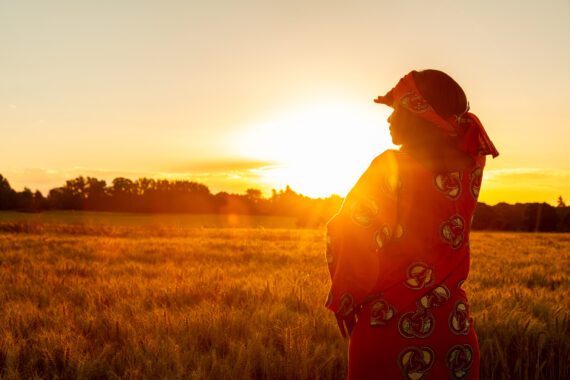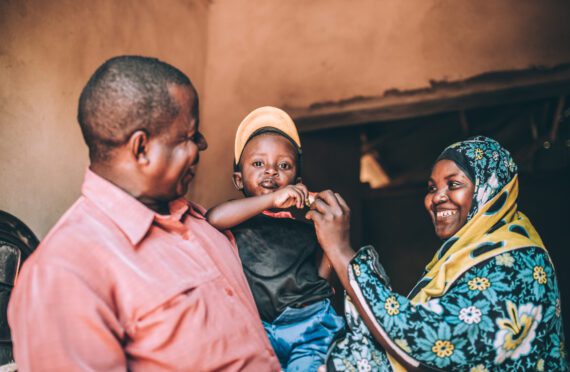By Isabel Vander Molen
Bread for the World recognizes the role of climate change as a top cause of global hunger through impacts such as more frequent and prolonged droughts and floods; reduced food quantity and nutrient quality; and a loss of livelihoods that forces people to abandon their homes. Confronting climate change is essential to ending hunger in Africa since farming employs about half of sub-Saharan Africa’s workforce, and parts of the continent, particularly the Sahel countries just south of the Sahara, are among the world’s most vulnerable areas to climate change and hunger.
The inaugural Africa Climate Summit, held September 4-6, 2023, in Nairobi, Kenya, set out to draw attention and attract international investment to African climate solutions and innovations. During the summit, stakeholders from the United States, the United Kingdom, the United Arab Emirates (UAE), and Germany joined other governments in announcing commitments to invest in new climate programs. The United States announced that it would provide an additional $20 million to the African Adaptation Initiative (AAI) Food Security Accelerator, which is intended to increase private sector investments in food security innovations. The Nairobi Declaration presented Africa’s common positions and calls to action in the lead-up to COP 28 in late 2023.
At the same time as its accomplishments have been noted, the Summit has also received criticism for problems with equity and ownership. At the conclusion of their side event held during the Climate Summit, interfaith leaders from across Africa released an Africa Climate Summit Statement of Faith in response to the Nairobi Declaration. The Faith Statement highlighted issues that faith leaders believed had not been sufficiently addressed, among them equity in financing for climate adaptation and food security in Africa.
According to faith leaders, despite the large numbers of farmers and farm laborers in Africa and the ongoing threat to food security posed by climate change, there was minimal discussion of these issues in the Nairobi Declaration. The language in the Nairobi Declaration on climate change solutions related to food and agriculture lacked specificity. In response, the faith group called for African leaders to “prioritize climate change coping strategies featured in various agricultural methods such as agroecology, conservation, and adaptive agriculture.” Prominent faith-based organizations such as Tearfund, Christian Aid, and ClimateYES joined in support of the urgent need to promote food sovereignty and ensure that agricultural policies prioritize local communities and environments to make Africa more resilient to climate shocks and resulting hunger crises.
The faith leaders stated that global north leaders should “move past announcements to delivery on commitments made.” Notably, there are previous climate finance commitments to developing countries that have not been met. These include European and U.S. commitments to mobilize $100 billion annually to fight climate change as well as lagging U.S. investments in the Green Climate Fund.
Equitable funding and local leadership in inclusive efforts are both essential for true collaboration with African communities to end hunger. Funding commitments for agriculture and climate resilience, such as the investment in the AAI Food Security Accelerator announced by the United States, must be honored. Further, including the voices of the African faith community is critical for just, equitable, and sustainable development, because these leaders align with and represent local communities.
African organizations, both faith-based and secular, are demanding to be more involved in international climate change talks. For example, an Africa People’s March after the Climate Summit brought together more than 500 local civil society organizations and was joined by the faith leaders who had convened during the Summit. The march was held to protest the insufficiency of the climate solutions discussed at the Climate Summit.
The legacy of colonialism, racism, and unjust global financial structures continues to hinder efforts to end hunger and enable communities to adapt to climate change. During the faith leaders’ meeting, Ezekiel Lesmore from the All Africa Conference of Churches argued that climate change issues shouldn’t be politicized or reduced to economic justifications; instead, they must be treated seriously, as a matter of life and death.
Bread continues to advocate for holistic hunger solutions and equitable climate finance for countries facing hunger and climate change crises. The recent Faith Leaders’ Summit in Nairobi exemplifies the role faith groups are playing as representatives of local communities in international discussions of climate change and hunger. At the same time, governments and other global actors need to consciously include faith groups in such discussions.
In the words of the Faith Statement released at the conclusion of the Africa Climate Summit, thoughtful adoption of such principles will help ensure that we can together “have the power to restore what has been destroyed” and “heal what has been wounded.”
Isabel Vander Molen is the Climate Hunger Fellow, Policy and Research Institute, with Bread for the World.



